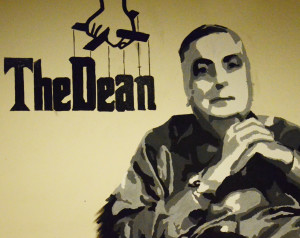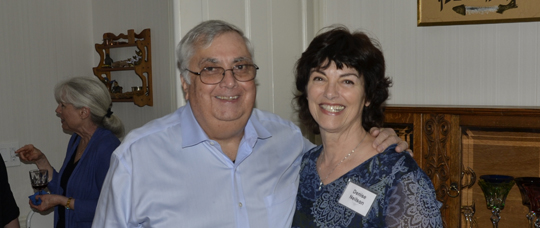By now you are all aware that Professor Matt Werner has executed a successful coup d’état and will be the next Dean of Webb Institute. That explains why he was spending so much time last semester in my office with a measuring tape. I wish him all the good fortune and support I have been given in my time here. I’m sure he will do a great job. When Roger Compton retired, I had some very big shoes to fill. Matt has the advantage of only having to fill a raggedy pair of flip flops.
 So, that makes me the Lame Duck Dean.
So, that makes me the Lame Duck Dean.
There are many things I’ll miss about this job. One of the most rewarding times is when the students return from winter work. The freshmen have not only seen, many for the first time, how complex a process it is to build a boat or ship, but they have grown in so many ways. The terms they were introduced to in their Introduction to Naval Architecture course now roll off their tongues because they have lived with these things, and the experience has reinforced their desire for more. They have also learned what it is like to get up in the cold, dark morning, get their own breakfast, work a full day, shop for their own groceries, and generally take care of themselves. The sophomores come back rough, tough sailors who have seen the world and know what it is like to be at sea. We even were affected by the longshoremen’s strike on the west coast, not knowing for sure when ships would arrive or depart, but managed to weather that situation without serious mishap. That, in itself, is a learning experience. The juniors and seniors return from their professional positions closer to being colleagues than students. I will miss the excitement of that first week back in the spring, and all the stories that are told, very, very much.
Meanwhile things continue to move along here. The juniors have again chosen a wide range of vessels for their Ship Design I projects: a polar icebreaker, a salvage/diving support liftboat, a high-speed ferry to Ibiza, a low-cost harbor patrol boat for third-world countries, a Mini-Maxi 72 offshore racing boat, and a pipe-laying vessel. The latter may be the most complex vessel the students have tackled in my experience here, and we are all learning a lot. These vessel choices indicate the breadth of industry interest of our students, and it is important to continue to encourage that. I have made an effort to not only identify appropriate industry mentors for the various vessel types but also help the students find opportunities to further their knowledge and expand their professional networks. With the help of Admiral Olsen, the icebreaker group was able to ride an icebreaking tug on the upper Hudson River, then out to Michigan to ride the USCGC Mackinaw on the Great Lakes. Unfortunately, the Mackinaw was diverted to aid an ice-bound vessel, but they were able to spend a brief time on another cutter. The liftboat group attended the one-day meeting of the American Salvage Association in Stamford, Connecticut, and was able to gather valuable information for their design, and the Ferry group was able to attend the Ferry Safety and Technology conference in New York City and make many contacts. Two members of the ferry design team will make the ultimate sacrifice during Spring Break and ride the Barcelona to Ibiza ferry to gain first-hand knowledge of the clientele. It’s a tough job, but someone has to do it. I hope future juniors will be able to make similar trips to further their professional knowledge.
This is “thesis emotion” season. The seniors are starting to panic over failed testing equipment and onrushing deadlines and the juniors are experiencing growing excitement over their choices of thesis topics for next year. We do our best to calm the seniors down and rein the juniors in. I have great confidence the senior theses will be successfully completed, and the faculty will help the juniors identify a workable scope for their projects.
We continue to arrange an eclectic group of very accomplished speakers for the Monday Lecture Series. We started with a repeat visit from Mark Meirowitz of SUNY Maritime, who spoke on Constitutional Law and the Separation of Church and State, then Gerhardt Muller, well-known in the industry, who addressed Logistics and the Future of Shipping. They were followed by Dawn Riley of the Oakcliff Sailing Center and America’s Cup fame who discussed her outstanding career in sailing, and Charles Southall, Chief Engineer at HII Newport News Shipbuilding to discuss the importance of engineering as a career. Our last two speakers were architect Paul Bentel on Maritime Architectural Preservation and Brian (Puck) MacInnes, professional sailor, to talk about his experiences in offshore racing. Quite a group. We also had two Zeien lectures this semester: the first by Mike Petters, President and CEO of Huntington-Ingalls Industries who talked about the challenges of managing a major company; the second by Congressman Steve Israel who discussed the major issues facing the United States in the next decade. In both cases the students distinguished themselves with the quality of their questions following the initial presentations.
The students maintain their enthusiasm and energy. Founder’s Day was a great success. It is heartwarming to see the students throw themselves into campus projects in partial repayment of Mr. Webb’s generosity. The dinner that evening was, again, delicious and was barely spoiled by the surprising choice of the Founder’s Day speaker–me. I was truly honored to be asked to speak at Founder’s Day.
Sports continue to take on a therapeutic role at Webb. The volleyball team is actually competitive this year and has guaranteed they will not suffer a winless season. The tennis team carries on led, by Pat Doherty, who makes sure matches are fun, win or lose, and the sailing team has enjoyed their normal successful season.
When one is coming to the end of a journey, milestones become very important. Over the last year, Denise and I have noted many “last times”; some are celebrations, some filled with melancholy, but all are part of the process of completion. We want to maintain contact, and we certainly plan on coming back, but it is time for good-byes. As the days dwindle down to a precious few, Denise and I find we have so many things we still want to do and so many people to thank, we hardly know where to begin.
To the parents of the students, thank you for loaning me your children for a while. They have helped me grow.
To those friends in the industry who have responded to my many requests for help in obtaining work-term positions for the students and to serve as mentors for Ship Design projects, thank you.
To the adjunct faculty, thank you for bringing ideas and enthusiasm to the campus along with your expert knowledge.
To the staff, thank you for your patience and support as we wrestle with our administrative duties. To Josie, a special thanks for the help in keeping me on task every day.
To the kitchen staff, thank you for your cheerfulness and the extra pounds I now lug around.
To the maintenance and facilities staff: Fernando, Mario, Javier, Victor, Julian, Andrew, Marcial, Rosa, and Emma, thank you for the tender care you have shown us. We are truly grateful.
To our neighbors, Keith and Peggy and John and Leslie, thank you for being our friends.
And to the faculty and lab technicians, I do know what you do every day and how much you care about the students, about each other, and about the continued legacy of Webb Institute.
All of you are responsible for carrying on Mr. Webb’s dream.
As for me, old Deans never die, they just retire to a home on the water. Denise and I are headed for the Northern Neck of Virginia to enjoy the land of pleasant living.

